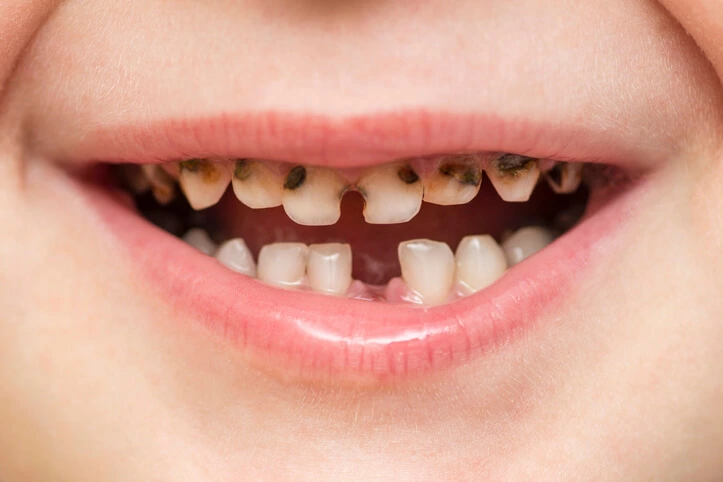As parents, caregivers, and healthcare professionals, ensuring the well-being of infants is a top priority. However, despite our best intentions, certain practices can inadvertently lead to dental health issues in babies. One such concern is Baby Bottle Syndrome (BBS), a condition that can have long-lasting effects on a child’s oral health. In this article, we delve into the causes, effects, prevention, and treatment of Baby Bottle Syndrome, aiming to provide comprehensive insight into this important aspect of infant care.
Table of Contents
ToggleWhat is Baby Bottle Syndrome?
Baby Bottle Syndrome, also known as Early Childhood Caries (ECC) or Nursing Bottle Caries, refers to severe decay in the teeth of infants or young children. It primarily affects the upper front teeth, but other teeth can also be involved. BBS is often associated with prolonged and frequent exposure to sugary liquids, such as milk, formula, fruit juice, or sweetened water, typically through prolonged bottle-feeding or breastfeeding on demand during sleep.
Causes of Baby Bottle Syndrome
Several factors contribute to the development of Baby Bottle Syndrome:
- Prolonged Bottle-Feeding
- Frequent Snacking
- Poor Oral Hygiene
- Bacterial Transmission
Prolonged Bottle-Feeding
Allowing a baby to fall asleep with a bottle containing milk, formula, or sugary liquids can result in prolonged exposure of the teeth to sugars, increasing the risk of tooth decay.
Frequent Snacking
Offering sugary snacks or drinks throughout the day, especially when sipped from a bottle or sippy cup, can lead to a constant bathing of the teeth in sugars, promoting bacterial growth and tooth decay.
Poor Oral Hygiene
Inadequate or improper oral hygiene practices, such as infrequent brushing or not cleaning the gums after feeding, can contribute to the accumulation of plaque and bacteria, further exacerbating the risk of decay.
Bacterial Transmission
Transfer of bacteria from caregivers to infants, often through shared utensils or tasting the baby’s food, can introduce cavity-causing bacteria into the infant’s mouth, increasing susceptibility to decay.
Effects of Baby Bottle Syndrome
The consequences of Baby Bottle Syndrome can be significant and may extend beyond dental health:
- Tooth Decay
- Pain and Discomfort
- Speech and Language Development
- Nutritional Deficiencies
Tooth Decay
The primary effect of BBS is severe tooth decay, which can lead to pain, infection, and loss of teeth. Decay in the primary (baby) teeth can also affect the eruption and alignment of permanent teeth, potentially causing long-term dental issues.

Pain and Discomfort
Advanced tooth decay can cause pain, discomfort, and difficulty eating or sleeping, affecting the child’s overall well-being and quality of life.
Speech and Language Development
Dental problems resulting from BBS, such as missing or decayed teeth, can impact speech development and pronunciation, potentially affecting communication skills in the long run.
Nutritional Deficiencies
Painful or decayed teeth may interfere with a child’s ability to chew properly, leading to dietary restrictions and potential nutritional deficiencies, which are crucial for overall growth and development.
Prevention of Baby Bottle Syndrome
Preventing Baby Bottle Syndrome involves adopting proactive measures to promote good oral hygiene and healthy feeding practices:
- Limit Sugary Liquids
- Proper Feeding Techniques
- Practice Good Oral Hygiene
- Regular Dental Check-ups
- Avoid Sharing Utensils
Limit Sugary Liquids
Avoid giving infants sugary drinks, such as fruit juice or sweetened water, in bottles or sippy cups. Instead, encourage the use of water as the primary beverage between meals.
Proper Feeding Techniques
If bottle-feeding is necessary, hold the baby during feedings and remove the bottle once the feeding is complete, rather than allowing the baby to fall asleep with the bottle in their mouth.
Practice Good Oral Hygiene
Begin cleaning the baby’s gums with a clean, damp cloth after feeding, and as soon as teeth emerge, start brushing them with a soft-bristled toothbrush and water.
Regular Dental Check-ups
Schedule the child’s first dental visit by their first birthday or within six months after the eruption of the first tooth, whichever comes first, to monitor dental development and identify any potential issues early on.
Avoid Sharing Utensils
Refrain from sharing utensils, pacifiers, or tasting the baby’s food to minimize the transmission of cavity-causing bacteria.
Treatment of Baby Bottle Syndrome
Treatment for Baby Bottle Syndrome varies depending on the severity of the condition but may include:
- Dental Restoration
- Fluoride Treatment
- Education and Counseling
Dental Restoration
Restorative treatments such as fillings, crowns, or extractions may be necessary to address decayed or damaged teeth and alleviate pain.
Fluoride Treatment
Application of fluoride varnish or fluoride supplements may be recommended to strengthen the enamel and prevent further decay.
Education and Counseling
Educating parents and caregivers about proper oral hygiene practices, healthy feeding habits, and the importance of regular dental visits is crucial in preventing recurrence of BBS and promoting optimal dental health.
Conclusion
Baby Bottle Syndrome is a preventable yet significant dental health concern affecting infants and young children. By understanding the causes, effects, prevention, and treatment of BBS, parents, caregivers, and healthcare professionals can take proactive steps to safeguard the oral health and overall well-being of young children. Through proper feeding practices, good oral hygiene, regular dental check-ups, and education, we can minimize the risk of Baby Bottle Syndrome and ensure healthy smiles for our little ones.
As guardians of children’s health, let’s prioritize preventive measures and early intervention to combat this Syndrome and promote a lifetime of optimal dental health.

